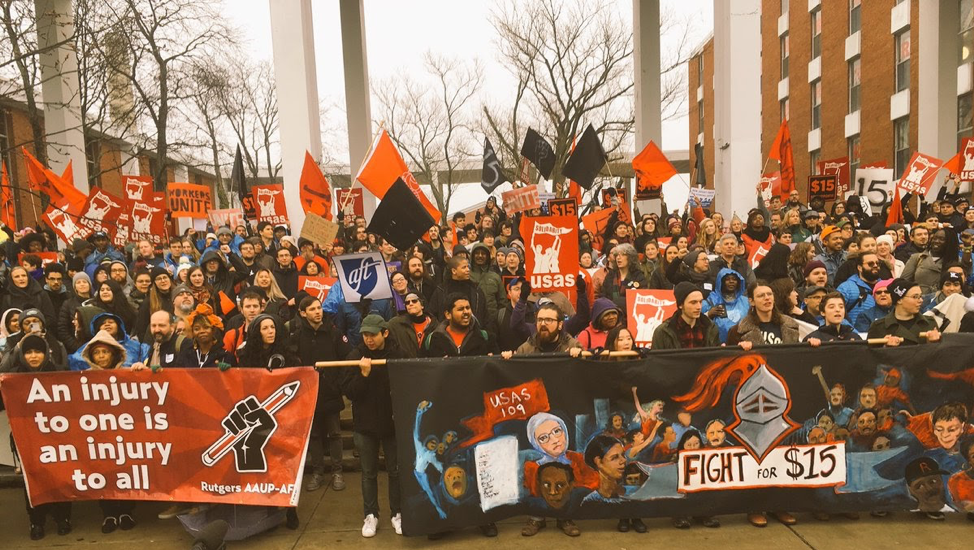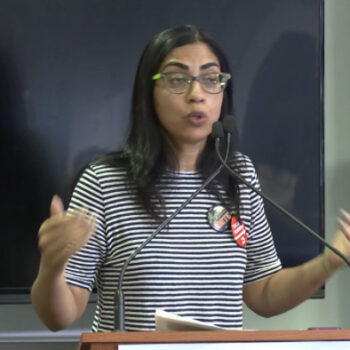Coronavirus is disrupting what we do and how we do it. Like the Great Recession, it’s been a shock to our system. But unlike the Great Recession, we need to be better organized to protect, defend and expand workers’ rights during and after this crisis. No industry or sector is immune to the impacts of Coronavirus. Our current moment is unprecedented, but what is certain is another round of austerity, perhaps the greatest we have experienced in decades. We need to look at previous rounds of austerity–real or manufactured–and not just maintain a defensive stance. COVID-19 is threatening to upend our social and economic system.
Higher education was roiling with changes prior to the pandemic. Post-millennial boom, declining enrollment, skyrocketing tuition and the ticking time bomb of education debt and state under-funding all bode ill for higher education, particularly tuition-dependent colleges. Add to this relentless right-wing attacks on diversity, workers’ rights and the humanities, and we are left with a battered and beleaguered system. Corporate donors, corporate trustees and corporate practices have eroded all parts of academia and surrounding communities. Now, under a grave global crisis, higher education will soon face existential questions as a new recession promises to wash over us.
Campus closures in response to COVID 19 are coming at a rapid clip and we are all struggling to adjust quickly. In higher education, we are doing so by not ceding to management asserting unilateral authority to “change the rules.” Campus workers (faculty, graduate student workers and non-instructional staff), our students and alumni, and community residents must have a seat at the table. Any temporary work rule changes, like online instruction or working remotely, closures of buildings or continued openings, and the use of harsh chemicals and solvents must all be agreed upon and temporary, until fully negotiated with our unions and other impacted stakeholders, including students, alumni and community residents. Yes, COVID-19 is fast-moving and many are making decisions on the fly, but we can and must do this together because the impact is on all of us.
With the upending of life and potentially higher education as we know it, organized labor in academia must have frank conversations about the kind of higher education system we had in the US pre-pandemic. Who was it working for and who was marginalized? Where was the money coming from and what was it going to? How were decisions being made and what were the results of those decisions? Now faced with the dark reality of COVID-19, we need to ask ourselves, what kind of system do we want?
Our universities are safety nets for the most vulnerable in our communities, whether housing insecure students and international students, or community residents relying on educational, nutritional and health care services. Our colleges are often the anchor institutions in small communities and even in large cities, affecting local economies, social well-being and the environment. Given this responsibility, organized labor in academia must do what we do best–organize! Organize ourselves to be a stronger, more united presence on campus – for pay equity and job security for our most precarious members with a greater emphasis on diversity for our students, faculty and staff. Organize with our students as one campus community. Organize surrounding communities who are impacted by campus decisions yet are excluded from the decision-making process. Many of us are starting to use an approach that has been pioneered in K-12 education, Bargaining for the Common Good (BCG).
Last year, in November 2019, dozens of activist members, elected leaders and staff from multiple unions representing workers at colleges and universities around the country gathered in Washington, D.C. to think more about BCG in higher education. We talked about the need to come together collectively to turn our institutions into forces to transform our communities. We discussed how to create innovative demands working closely with students, surrounding neighborhoods and other key partners. We dug into the possibilities like demanding open access to healthcare services; research and medical institutions dedicating a portion of their work to improving the healthcare of the immediate community rather than lining the future pockets of pharmaceutical corporations and health system conglomerates; increased support for low-income and Black and Brown students that breaks the school to prison pipeline and, yes, meaningful federal debt relief. We imagined what our colleges and universities could be.
In the current crisis, it is absolutely essential that we are united. We must fight not just for our members, but all campus workers, students and our communities. Colleges and universities should immediately process refunds for students for room and board, starting with our most vulnerable students. We need to expand federal funding for student aid, including a temporary waiver of any workplace attendance requirements for work-study students. No student should have to put work ahead of personal health and safety. No student should be denied resources to fully succeed in stressful times. We should think about how empty dormitories can be used safely to support housing insecure students and staff and even community members.
Finally, we should use this crisis moment to refortify shared governance models on our campuses, especially collective bargaining, and ensure that bargaining includes ALL of those impacted by adopting a Bargaining for the Common Good approach. If we do not, we will quickly cede complete control over higher education to the corporate actors and billionaires at a time of crisis when the equity, dignity and security for our communities are most at stake.


